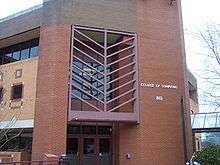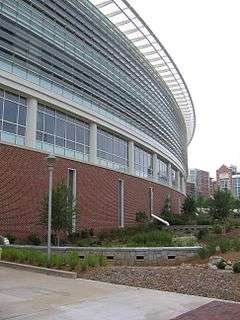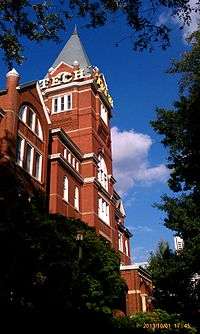Georgia Institute of Technology College of Computing
 | |
| Type | Public |
|---|---|
| Established | 1964/1988[1] |
| Dean | Zvi Galil[2][3] |
Academic staff | 120[4] |
| Undergraduates | 1278[5] |
| Postgraduates | 781[5] |
| Location |
Atlanta, Georgia, USA 33°46′39″N 84°23′51″W / 33.77747°N 84.39738°WCoordinates: 33°46′39″N 84°23′51″W / 33.77747°N 84.39738°W |
| Website |
www |
The College of Computing at the Georgia Institute of Technology has roots stretching back to an Information Science degree established in 1964.[1] In 1988, Georgia Tech president John Patrick Crecine elevated the School of Information and Computer Science to become the College of Computing, making Georgia Tech the second university to do so, after Carnegie Mellon University created their School of Computer Science.[1]
Beyond using contemporary computer technology, the College of Computing also seeks new concepts and technology, with symbiotic connections to departments in other Colleges of Georgia Tech, in a holistic manner, such as combining with studies in human psychology, medical science, liberal arts, and business (e-commerce). The most prominent example of this interdisciplinary symbosis is the College's Threads curriculum for its B.S. in Computer Science degree, launched in 2006. Another example is the degree program for B.S. in Computational Media is offered jointly and collaboratively within Georgia Tech's School of Literature, Media, and Communication in the Ivan Allen College of Liberal Arts.
The College of Computing also has a tradition of a symbiosis between faculty and students: since the early years, older students have been assisting professors in research. Faculty members in the College of Computing have been receptive to new technology developed with students, rather than demanding outside ideas and "Not Invented Here" computer systems.[1]
In 2014, U.S. News & World Report ranked the Computer Science program #9 in the U.S.[6]
History
Early years
The history of Georgia Tech's College of Computing spans over 43 years.[1] As a field of study, the concept began in 1963 when a group of faculty members led by Dr. Vladimir Slamecka and including Dr. Vernon Crawford, Dr. Nordiar Waldemar Ziegler, and Dr. William Atchison, noticed a symbiosis between departments. The group drafted an outline for a masters level program which combined library science, mathematics, and computer technology.[1] Upon acceptance by the Georgia Tech administration, the M.S. in Information Science was first offered in 1964 under the School of Information Science at Georgia Tech led by Dr. Slamecka.[1]
In 1970, the school began offering a minor degree program for all Georgia Tech students, and was renamed to the School of Information and Computer Science (ICS). Two years later in 1972, ICS expanded to offer an undergraduate degree for students. It also partnered with Emory University to create a joint graduate program in Biomedical Information and Computer Science, the first partnership of its kind.[1]
In 1979, ICS's first director and primary founder, Dr. Slamecka, retired from the position after 15 years. Dr. Ray Miller, IBM's Assistant Director of Mathematical Sciences, was hired in his place. Under Miller, the School of Information and Computer Science began a trend which began to move away from information science and towards computer science.[1]
College
In John Patrick Crecine's 1988 reorganization of the Institute, the School was broadened as the College of Computing, one of the school's five (and in 1998, six) colleges. Georgia Tech was the first university in the United States to have a College of Computing.[1] The school hired its first dean, Peter A. Freeman, in 1990,[7] and further expanded in 2005 with more divisions.[1]
In 2000, successful internet entrepreneur and Tech alum Chris Klaus donated $15 million towards the construction of a new building for the college.[8][9][10] At the time of Klaus' contribution, it was the fifth-largest contribution by an individual in Georgia Tech's history.[8] The building was officially opened on October 26, 2006.[11][12]
Recent history
In February 2007, the divisions were formalized into two schools: the School of Computer Science (SCS) and the School of Interactive Computing (SIC).[13]
In June 2008, College of Computing Dean Richard DeMillo announced plans for his resignation, citing conflicts with Georgia Tech provost and interim president Gary Schuster. DeMillo was temporarily replaced by James D. Foley, a professor in the School of Interactive Computing, until a permanent replacement could be found.[14] On April 9, 2010, Zvi Galil was named the college's new dean.[2]
In March 2010, the division of Computational Science & Engineering (CSE) was also formalized into a school.[15]
The school is involved in DARPA's ADAMS project via the Proactive Discovery of Insider Threats Using Graph Analysis and Learning system.[16][17]
In May 2013, the school announced that it will offer the first professional Online Master of Science degree in computer science (OMS CS) that can be earned completely through the massive online (MOOC) format in partnership with Udacity.[18] In August 2013, US President Barack Obama praised the school as “a national leader in computer science” that is offering a master's degree in computer science “at a fraction of the cost".[19]
Programs, Departments and Schools
- School of Computer Science
- School of Interactive Computing
- School of Computational Science & Engineering
Facilities
- College of Computing Building[20]
- Klaus Advanced Computing Building[21][22]
Degrees
Undergraduate
The College of Computing has evolved, along with advancing computing technology and applications, to offer an increasing variety of specialized degrees, including:
- B.S. in Computer Science (a minor in Computer Science is also available)
- B.S. in Computational Media (offered as a joint degree with the Ivan Allen College of Liberal Arts)
Graduate
The following graduate certificates are offered:
- Graduate Certificate in Information Assurance (Interdisciplinary certificate offered jointly with the School of Electrical and Computer Engineering)
- Graduate Certificate in Modeling and Computer Simulation
Additionally, the following degrees are offered:
- M.S. in Computer Science (which is also offered entirely online through the Online Master of Science in Computer Science (OMS CS) program).
- M.S. in Human-Computer Interaction
- M.S. in Information Security
- M.S. in Bioengineering
- M.S. in Computational Science and Engineering (joint degree with the College of Engineering and the College of Sciences)
Postgraduate
- Ph.D. in Computer Science
- Ph.D. in Human-Centered Computing
- Ph.D. in Algorithms, Combinatorics, and Optimization
- Ph.D. in Bioengineering (joint degree with the College of Engineering)
- Ph.D. in Bioinformatics (joint degree with the School of Biology)
- Ph.D. in Robotics (joint degree with the College of Engineering)
- Ph.D. in Computational Science and Engineering (joint degree with the College of Engineering and the College of Sciences)
OMSCS
The Georgia Tech Online Master of Science in Computer Science is a pre-eminent MOOC leading to a fully accredited Masters qualification, presented in conjunction with Udacity. A contribution of $2 Million from AT&T has funded the initial development of the program as well as continuing integration of technology.[23]
The program is designed and maintained to present a level of academic challenge entirely equivalent to a traditional MSCS course, with equivalent academic rigor as a founding principle.[24] The estimate of the cost of studying the course is however very different; being in the region of $7,000 for a student completing the Masters course in 2 years; composed of the minimum 10 for graduation 3-credit-hour courses @ $510 per course plus $301 enrollment fee per semester for say 6 semesters.[25]
Although it is identical to the traditional MSCS program at Georgia Tech, transcripts of OMSCS students and alumni will list all classes taken with an "O" designation("O" for online) as opposed to the transcripts of on-campus students which have the designation of "A"("A" for Atlanta)
The first semester of study, in Spring 2014, some 400 students were enrolled in the program. In January 2015 some 2,000 students were enrolled in the program.[24] As of January 2016 that figure is in the region of 3,000 students. 20 students graduated with their master's degrees in December 2015.[26] In May 2016, 62 additional students graduated with their master's degrees.
Enrolment is accessible without restriction on the basis of citizenship, residence, or visa status, to students from all around the world. However, the vast majority of enrolled students as of January 2016 are US citizens. The program does however mirror the gender imbalance found in many CS courses, with female students considerably outnumbered.
Research
The College of Computing is the third-highest of Georgia Tech's six colleges (behind the larger and older College of Engineering and College of Sciences) in research awards, with 139 proposals worth $93,737,529 resulting in 119 awards worth $14,579,392 in 2006.[27]
There are several organizations tied to or within the College of Computing that are primarily dedicated to research. These include several research groups and labs.[28] Other research-related organizations include:
- GVU Center, which is primarily dedicated to computer graphics and human-computer interaction[29]
- Center for Experimental Research in Computer Systems, which focuses on hardware aspects of computer science[30]
- STI Center of Competence for the Cell Processor, which is focused on high-performance computing especially as it pertains to the cell processor[31]
- Georgia Tech Information Security Center, which deals with information security issues such as cryptography, network security, trusted computing, software reliability, privacy, and internet governance.[32]
- Center for Robotics and Intelligent Machines, which is an interdisciplinary research unit that offers a Ph.D. program in robotics[33]
- Georgia Tech Algorithms and Randomness Center ThinkTank
Student life and community
The College of Computing has numerous student organizations which help build a community within the college. These organizations include:
- Anime O-Tekku [34]
- Association for Computing Machinery[35]
- Entertainment Software Producers [36]
- Freshmen Mentoring Program
- Minorities @ CC [37]
- Student Activities Board [38]
- The FIREwall [39]
- Undergraduate Council [40]
- Upsilon Pi Epsilon [41]
- Women @ CC [42]
- Tech Entrepreneurs Society [43]
Alumni
| Name | Class year | Notability | Reference(s) |
|---|---|---|---|
| James Allchin | 1984 | Former high-level executive at Microsoft | [44] |
| Eric Allender | 1985 | Professor of computer science at Rutgers University. | [45] |
| Krishna Bharat | 1996 | Research scientist at Google that created Google News. | [46] |
| Tom Cross | 1999 | American entrepreneur, computer security expert, and hacker | [47][48] |
| Richard DeMillo | 1972 | Former high-level executive at Hewlett-Packard and dean of the College of Computing. | [49] |
| D. Richard Hipp | 1984 | Architect and primary author of SQLite | [50] |
| Billy Hoffman | 2005 | American hacker; along with Virgil Griffith, discovered a security flaw in Georgia Tech's magnetic ID card system ("BuzzCard") and was sued by BuzzCard maker Blackboard Inc. | [51] |
| Paul Q. Judge | 2002 | Entrepreneur and technical expert | [52] |
| Craig Mundie | 1972 | Chief research and strategy officer at Microsoft | [53] |
| James F. O'Brien | 2000 | Professor of Computer Science at University of California, Berkeley | [54] |
| Rosalind Picard | 1984 | Founder and director of the Affective Computing Research Group at the Massachusetts Institute of Technology | [55][56] |
| Mike Pinkerton | 1997 | American software developer working on the Mozilla browsers. He lectures on Development of Open Source Software at George Washington University | [57] |
| Gene Spafford | 1981 | Professor of computer science at Purdue University and a leading computer security expert | [58] |
| Jeff Trinkle | 1979 | Professor and Chair of Computer Science at Rensselaer Polytechnic Institute in Troy, New York | [59] |
| Shwetak Patel | 2003 (BS), 2008 (PhD) | WRF Endowed Professor of Computer Science & Engineering and Electrical Engineering at University of Washington in Seattle, WA | [60] |
See also
- GVU Center
- Georgia Tech Information Security Center
- Institute for Personal Robots in Education
- Sony Toshiba IBM Center of Competence for the Cell Processor
- Center for Robotics and Intelligent Machines
References
- 1 2 3 4 5 6 7 8 9 10 11 "History". Georgia Tech College of Computing. Retrieved 2007-08-15.
- 1 2 Hagearty, Michael (2010-04-09). "Institute Names Next College of Computing Dean". Georgia Institute of Technology. Retrieved 2010-04-09.
- ↑ "Zvi Galil Named GT Dean of Computing". Georgia Tech College of Computing. 2010-04-09. Retrieved 2010-04-09.
- ↑ "COC: Facts at a Glance, 2006" (PDF). Retrieved 2007-03-28.
- 1 2 "GT Computing Annual Report 2012-2013" (PDF). Retrieved 2014-09-25.
- ↑ "Best Grad Schools: Computer Science: US News Graduate Schools" (Press release). US News & World Report. 2014-04-15. Retrieved 2014-05-28.
- ↑ Miller, Raymond E. "Over 50 Years in Computing: Memoirs of Raymond E. Miller" (PDF). University of Maryland Department of Computer Science. Retrieved 2007-08-15.
- 1 2 Dykes, Jennifer (2000-03-31). "REAL NEWS: Young entrepreneur donates $15 million to College of Computing". The Technique. Archived from the original on 2007-09-29. Retrieved 2007-07-13.
- ↑ Dunn, John (November 2006). "Tech Dedicates Klaus Advanced Computing Building". Buzz Words. Georgia Tech Alumni Association. Retrieved 2007-07-12.
- ↑ "Klaus Advanced Computing Building Grand Opening". Events. Georgia Tech College of Computing. Retrieved 2007-07-12.
- ↑ Kaul, Vivas (2006-11-03). "Klaus Building opens its doors to students". The Technique. Archived from the original on 2007-09-29. Retrieved 2007-07-12.
- ↑ Campell, Elizabeth (2006-10-30). "Advanced computing facility fuels collaborative spirit". The Whistle. Retrieved 2007-07-13.
- ↑ "College of Computing at Georgia Tech Announces Creation of Two Schools". Retrieved 2007-03-28.
- ↑ Keefe, Bob (2008-07-11). "Georgia Tech and high-profile dean part ways". Atlanta Journal-Constitution. Retrieved 2008-07-13.
- ↑ "Fujimoto to Chair New School of CSE" (Press release). Georgia Institute of Technology. 2010-03-08. Retrieved 2010-03-12.
- ↑ "Georgia Tech Helps to Develop System That Will Detect Insider Threats from Massive Data Sets". Georgia Institute of Technology. 2011-11-10. Retrieved 2011-12-06.
- ↑ Storm, Darlene (2011-12-06). "Sifting through petabytes: PRODIGAL monitoring for lone wolf insider threats". Computer World. Retrieved 2011-12-06.
- ↑ "Georgia Tech Announces Massive Online Master's Degree In Computer Science" (Press release). Georgia Institute of Technology. 2013-05-14. Retrieved 2013-07-27.
- ↑ "Obama Cites Georgia Tech's OMS CS as Future Model of College Affordability" (Press release). Georgia Institute of Technology. 2013-08-22. Retrieved 2014-02-02.
- ↑ "College of Computing Building". Georgia Tech College of Computing. Retrieved 2007-08-15.
- ↑ "KACB Grand Opening". Georgia Tech College of Computing. Retrieved 2007-03-28.
- ↑ Kaul, Vivas (2006-11-03). "Klaus Building opens its doors to students". The Technique. Archived from the original on September 29, 2007. Retrieved 2007-03-28.
- ↑ "Frequently Asked Questions - OMSCS". Georgia Institute of Technology. Retrieved 2016-01-08.
- 1 2 "So, How About That Online Computer Science Degree". Georgia Institute of Technology. Retrieved 2016-01-08.
- ↑ "Program Info - OMSCS". Georgia Institute of Technology. Retrieved 2016-01-08.
- ↑ "Online Pioneers: Online MS Program Produces First Grads". Georgia Institute of Technology. Retrieved 2016-01-08.
- ↑ "Research Scope". Georgia Tech Fact Book. Georgia Institute of Technology. Retrieved 2007-08-11.
- ↑ "Research Groups and Labs". Georgia Tech College of Computing. Retrieved 2007-08-15.
- ↑ "the GVU Center @ Georgia Tech". GVU Center. Retrieved 2007-08-15.
- ↑ "Center for Experimental Research in Computer Systems". Georgia Tech College of Computing. Retrieved 2007-08-15.
- ↑ "STI Center of Competence for the Cell Broadband Engine Processor". Retrieved 2007-08-15.
- ↑ "Georgia Tech Information Security Center History". Retrieved 2007-08-01.
- ↑ "RIM@GT Welcome page". Retrieved 2008-04-02.
- ↑ Anime O-Tekku
- ↑ Association for Computing Machinery
- ↑ Entertainment Software Producers
- ↑ Minorities @ CC
- ↑ Student Activities Board
- ↑
- ↑ The FIREwall
- ↑ Upsilon Pi Epsilon
- ↑ Women @ CC
- ↑
- ↑ "Career Paths of Recent Ph.D. Graduates". Georgia Tech College of Computing. November 2001. Retrieved 2007-03-08.
- ↑ "Academic History".
- ↑ "Alumni Spotlight: Krishna Bharat". Georgia Tech College of Computing. Retrieved 2007-03-08.
- ↑ Cross, Tom (September 2006). "Puppy smoothies: Improving the reliability of open, collaborative wikis". Retrieved 2007-03-08.
- ↑ Cross, Tom. "Georgia-Voter.Info". Retrieved 2007-03-08.
- ↑ "Richard DeMillo". Retrieved 2014-09-30.
- ↑ "Speaker D. Richard Hipp". O'Reilly Open Source Convention. Retrieved 2007-03-09.
- ↑ Cailloux, Tim (2003-04-18). "BuzzCard maker silences student". The Technique. Archived from the original on January 18, 2006. Retrieved 2007-03-03.
- ↑ "DR. PAUL JUDGE". Microsoft. Retrieved 2014-10-09.
- ↑ "Craig Mundie, Chief Research and Strategy Officer". Paul Judge. Retrieved 2014-10-09.
- ↑ "James F. O'Brien". U.C. Berkeley. Retrieved 2007-09-24.
- ↑ "Rosalind W. Picard". M.I.T. Media Laboratory. Retrieved 2007-03-09.
- ↑ "Rosalind Picard". Scientific American Frontiers. Public Broadcasting Service. Retrieved 2007-03-09.
- ↑ Pinkerton, Mike. "Mike Pinkerton's Resume". Retrieved 2007-03-09.
- ↑ "Eugene H. Spafford". Purdue University Department of Computer Science. 2006-12-02. Retrieved 2007-03-09.
- ↑ "Jeff Trinkle's Education and Experience". Rensselaer Polytechnic Institute Department of Computer Science. Retrieved 2007-03-09.
- ↑ http://www.shwetak.com. Missing or empty
|title=(help)

